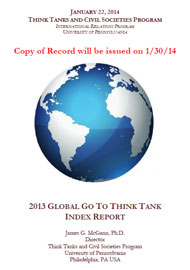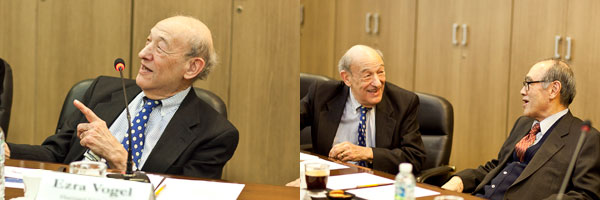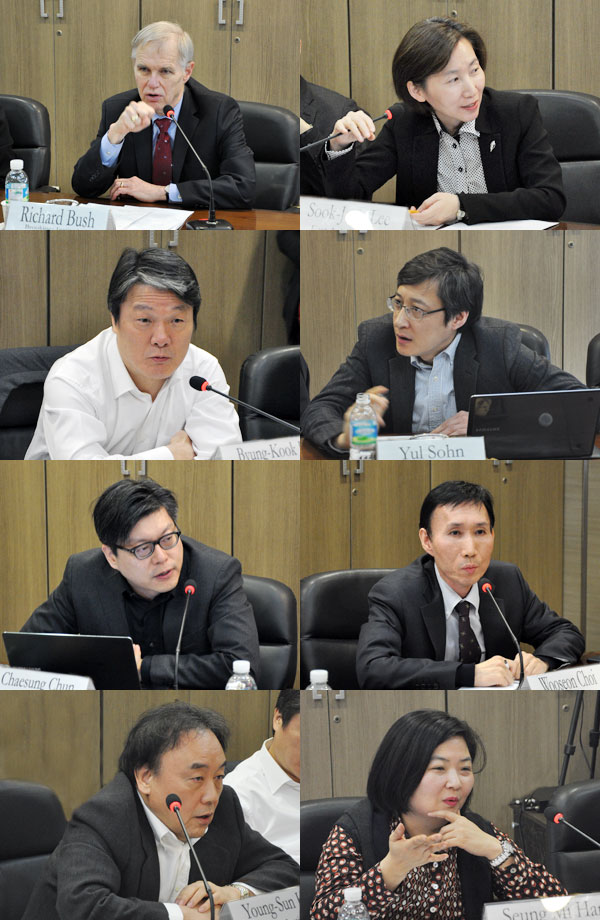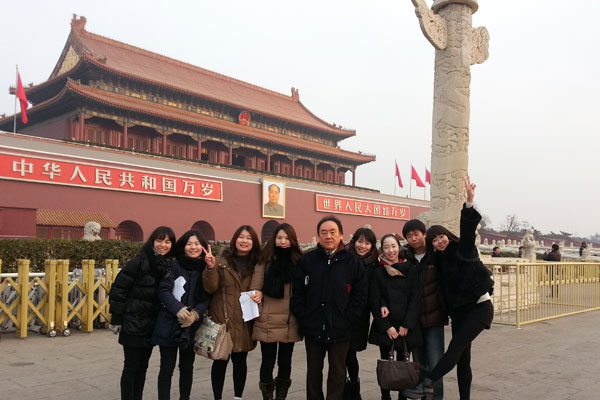 Middle Power Diplomacy Initiative Working Paper No. 2 Middle Power Diplomacy Initiative Working Paper No. 2
Explores Network Theory and
South Korea's Middle Power Diplomatic Strategies |
 Sangbae Kim argues that the existing studies of middle power are inadequate in providing guidelines for South Korea's new role because they focus on individual countries' attributes or capabilities to explain the general responsibilities of middle powers in world politics. Adopting "structural holes" and actor-network theory, Kim attempts to develop a theoretical framework to understand South Korea's diplomatic strategies as a middle power. The author suggests that South Korea can grasp opportunities to exploit structural holes in Northeast Asia, to manage asymmetric relationships among great powers in the region, and to bring together other actors for common interests. In acting as a broker - more than a mere connector - South Korea can become a complementary programmer that provides useful patches to trouble spots in the great power system. In this way, South Korea can contribute to the construction of regional architecture. Sangbae Kim argues that the existing studies of middle power are inadequate in providing guidelines for South Korea's new role because they focus on individual countries' attributes or capabilities to explain the general responsibilities of middle powers in world politics. Adopting "structural holes" and actor-network theory, Kim attempts to develop a theoretical framework to understand South Korea's diplomatic strategies as a middle power. The author suggests that South Korea can grasp opportunities to exploit structural holes in Northeast Asia, to manage asymmetric relationships among great powers in the region, and to bring together other actors for common interests. In acting as a broker - more than a mere connector - South Korea can become a complementary programmer that provides useful patches to trouble spots in the great power system. In this way, South Korea can contribute to the construction of regional architecture.
| | |
 |
| Upcoming Events |
Asia Democracy Network (ADN) Steering Committee Meeting
February 3-5, 2014
Singapore
Council of Councils (CoC) Fifth Regional Conference
February 23-25, 2014
Sydney, Australia | | |
 |
EAI Ranked No. 65 Among Global Think Tanks in Latest Report
 In the 2013 Global Go-To Think Tank Index Report, EAI was listed at No. 65 among all global think tanks in the yearly ranking conducted by the University of Pennsylvania's Think Tanks and Civil Societies Program. Among East Asian think tanks, EAI came in at No. 18 in the category that included all organizations from Korea, India, China, and Japan. In addition, EAI was globally ranked at No. 54 for outstanding policy-oriented public programs, best transdisciplinary research program, and the best use of social networks, as well as No. 55 for foreign policy and international affairs studies. In the 2013 Global Go-To Think Tank Index Report, EAI was listed at No. 65 among all global think tanks in the yearly ranking conducted by the University of Pennsylvania's Think Tanks and Civil Societies Program. Among East Asian think tanks, EAI came in at No. 18 in the category that included all organizations from Korea, India, China, and Japan. In addition, EAI was globally ranked at No. 54 for outstanding policy-oriented public programs, best transdisciplinary research program, and the best use of social networks, as well as No. 55 for foreign policy and international affairs studies. 
|
Ezra Vogel Discusses Deng Xiaoping in Smart Talk Forum
 On January 20, EAI welcomed Ezra Vogel to the institute for a Smart Talk Forum discussion on the role that Deng Xiaoping played in the transformation of China following the death of Mao Zedong. Vogel detailed Deng's path to power and his formative experiences both inside and outside of the Chinese government. The discussion also centered on Deng's achievements in foreign policy and economics as head of Chinese Communist Party when he helped create a safe regional security environment for China while pursuing economic gains. On January 20, EAI welcomed Ezra Vogel to the institute for a Smart Talk Forum discussion on the role that Deng Xiaoping played in the transformation of China following the death of Mao Zedong. Vogel detailed Deng's path to power and his formative experiences both inside and outside of the Chinese government. The discussion also centered on Deng's achievements in foreign policy and economics as head of Chinese Communist Party when he helped create a safe regional security environment for China while pursuing economic gains. 
|
Smart Talk with Richard Bush Debates Washington's Stance on Changing Security Dynamics
 Richard Bush, director of the Center for East Asia Policy Studies at the Brookings Institution, visited EAI on January 23 to participate in a Smart Talk Forum discussion on Washington's response to recent changes in the East Asian security landscape. Bush, along with a group of Korean experts, debated the impact of North Korea's execution of Jang Sung-taek on regional dynamics, emphasizing Washington's policy toward Pyongyang is "sharpening choices" rather than mere strategic patience. The group also discussed the U.S. response to China's recent assertive behavior in maritime and air defense issues. Richard Bush, director of the Center for East Asia Policy Studies at the Brookings Institution, visited EAI on January 23 to participate in a Smart Talk Forum discussion on Washington's response to recent changes in the East Asian security landscape. Bush, along with a group of Korean experts, debated the impact of North Korea's execution of Jang Sung-taek on regional dynamics, emphasizing Washington's policy toward Pyongyang is "sharpening choices" rather than mere strategic patience. The group also discussed the U.S. response to China's recent assertive behavior in maritime and air defense issues. 
|
EAI Sarangbang Travels to Beijing for Fieldwork
 The EAI Sarangbang program, a series of graduate lectures given by EAI Chairman Young-Sun Ha for students studying in Korea, spent three days in Beijing in early January conducting field research. The students went to China in order to research and better understand China's place in East Asian regional architecture after spending the semester studying East Asian political order. The group recorded their experiences and will publish an e-book based on their personal study projects related to the lecture series and the visit. The EAI Sarangbang program, a series of graduate lectures given by EAI Chairman Young-Sun Ha for students studying in Korea, spent three days in Beijing in early January conducting field research. The students went to China in order to research and better understand China's place in East Asian regional architecture after spending the semester studying East Asian political order. The group recorded their experiences and will publish an e-book based on their personal study projects related to the lecture series and the visit.
|
2014 EPIK Young Leaders' Conference: Essay Competition Is Launched
EAI announced the return of its EPIK Young Leaders' Conference: Essay Competition for 2014, issuing a call for papers in mid-January. The essay competition invites undergraduate, graduate, and recently-graduated students to ponder and write essays on the role of "followership" in its interaction with leadership and suggest the outlook of followership for the twenty-first century, exploring various historical and contemporary issues in any academic field. The first deadline is March 28 for 400-word abstracts, followed by the 5,000-word essay submission by June 13. The essay presentation and award ceremony will be held on August 13. 
|
#909 Sampoong B/D, Eulji-ro 158, Jung-gu, Seoul 100-786, Republic of Korea
Tel 82 2 2277 1683 | Fax 82 2 2277 1684/1697 | Email EAI | Unsubscribe
Copyright 2014© EAST ASIA INSTITUTE. All Rights Reserved. | |

